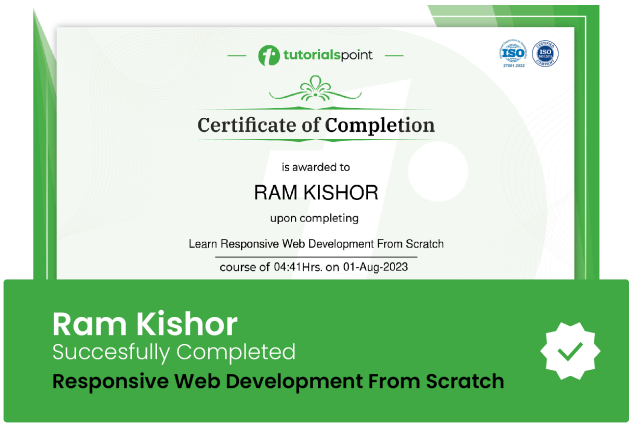Develop Java MVC web apps using MyBatis, Servlets & JSP
100% HANDS ON training by an industry expert to build powerful server side MVC web applications in Java.

Lectures -81
Resources -5
Duration -10 hours

30-days Money-Back Guarantee
Get your team access to 10000+ top Tutorials Point courses anytime, anywhere.
Course Description
Servlets and JSP
A Java servlet is a Java software component that extends the capabilities of a server. Although servlets can respond to many types of requests, they most commonly implement web containers for hosting web applications on web servers and thus qualify as a server-side servlet web API. Such web servlets are the Java counterpart to other dynamic web content technologies such as PHP and ASP.NET.
A Java servlet processes or stores a Java class in Java EE that conforms to the Java Servlet API, a standard for implementing Java classes that respond to requests. Servlets could in principle communicate over any client–server protocol, but they are most often used with HTTP. Thus "servlet" is often used as shorthand for "HTTP servlet". Thus, a software developer may use a servlet to add dynamic content to a web server using the Java platform. The generated content is commonly HTML, but may be other data such as XML and more commonly, JSON. Servlets can maintain state in session variables across many server transactions by using HTTP cookies, or URL mapping.
To deploy and run a servlet, a web container must be used. A web container (also known as a servlet container) is essentially the component of a web server that interacts with the servlets. The web container is responsible for managing the lifecycle of servlets, mapping a URL to a particular servlet and ensuring that the URL requester has the correct access rights.
The Servlet API, contained in the Java package hierarchy javax.servlet, defines the expected interactions of the web container and a servlet.
Servlets can be generated automatically from JavaServer Pages (JSP) by the JavaServer Pages compiler. The difference between servlets and JSP is that servlets typically embed HTML inside Java code, while JSPs embed Java code in HTML. While the direct usage of servlets to generate HTML has become rare, the higher level MVC web framework in Java EE (JSF) still explicitly uses the servlet technology for the low level request/response handling via the FacesServlet. A somewhat older usage is to use servlets in conjunction with JSPs in a pattern called "Model 2", which is a flavor of the model–view–controller.
MyBatis is a Java persistence framework that couples objects with stored procedures or SQL statements using an XML descriptor or annotations.
Apache MyBatis
MyBatis is free software that is distributed under the Apache License 2.0.
MyBatis is a fork of iBATIS 3.0 and is maintained by a team that includes the original creators of iBATIS.
Unlike ORM frameworks, MyBatis does not map Java objects to database tables but Java methods to SQL statements.
MyBatis lets you use all your database functionality like stored procedures, views, queries of any complexity and vendor proprietary features. It is often a good choice for legacy or de-normalized databases or to obtain full control of SQL execution.
It simplifies coding compared to JDBC. SQL statements are executed with a single line.
MyBatis provides a mapping engine that maps SQL results to object trees in a declarative way.
Goals
What will you learn in this course:
- Learn the basics of Mybatis
- Understand SQL-Mappers
- CURD operations using Mybatis
- Build a DAO layer using Mybatis
- Create a Java dynamic web application using Servlets
- Differentiate between GenericServlet and HttpServlet
- Understand servlet life cycle functions
- Read and process HTTP request (query string) parameters
- Understand different scopes - request, session and application
- Generate different types of content (like .doc or .xls) based on user choice
- Understand the JSP architecture
- Understand JSP life cycle functions
- Combine Servlet and JSP to handle a single HTTP request
- Learn how JSP Custom tags work
- Learn JSP Expression Language and JSP Standard Tag Libraries (JSTL)
- Create a full fledged MVC application
Prerequisites
What are the prerequisites for this course?
- Basic knowledge of Java programming language is good enough
- Basic knowledge of HTML will help, but not necessary

Curriculum
Check out the detailed breakdown of what’s inside the course
Introduction
3 Lectures
-
Course intro 08:41 08:41
-
Software required on your PC / Laptop 01:18 01:18
-
Course resources
Creating our model using Apache MyBatis
14 Lectures

Java EE web components - Servlets and JSP
23 Lectures

Setting up the Phonebook MVC application
4 Lectures

Registration module
7 Lectures

Login and Logout module
5 Lectures

Login check filter
1 Lectures

Add new contact module
4 Lectures

View contact module
4 Lectures

View all contacts module
4 Lectures

Edit contact module
5 Lectures

Delete contact module
4 Lectures

More features
1 Lectures

Build and deploy
2 Lectures

Instructor Details

Vinod Kumar Kayartaya
eCourse Certificate
Use your certificate to make a career change or to advance in your current career.

Our students work
with the Best


































Related Video Courses
View MoreAnnual Membership
Become a valued member of Tutorials Point and enjoy unlimited access to our vast library of top-rated Video Courses
Subscribe now
Online Certifications
Master prominent technologies at full length and become a valued certified professional.
Explore Now


 Updated on Apr, 2024
Updated on Apr, 2024
 Language - English
Language - English